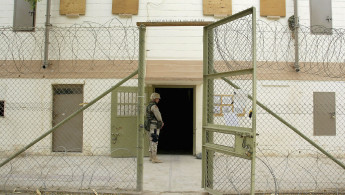Abu Ghraib civil lawsuit moves forward in US federal court
The lawsuit, which has been bounced between courts since being filed nine years ago, seeks to hold civilian interrogators employed by military contractor CACI liable for the abusive treatment of inmates at Abu Ghraib.
The abuses came to light with reports published in late 2003 by Amnesty International and The Associated Press.
Photographs were leaked of prisoners on leashes, dog attacks and sexual humiliation.
The Center for Constitutional Rights (CCR), which filed the lawsuit on the former inmates' behalf, claims that CACI interrogators engaged in a conspiracy to abuse the detainees to soften them up for questioning.
The lawsuit has been thrown out twice by a federal judge, only to be reinstated each time.
Evidence of torture
In Friday's hearing at the US District Court in Alexandria, Virginia Judge Leonie M. Brinkema refused a request by CACI to dismiss the case.
The court ruled that there was sufficient evidence that the three Iraqi plaintiffs were subjected to actions which could constitute torture or cruel, inhumane and degrading treatment and that the case can proceed, either in a pre-trial judgement or before a jury.
The hearing marked the first time in the course of the nine-year trial that CCR presented details in court of torture and mistreatment their clients say they endured at Abu Ghraib.
"The court has sent an important message that there can be accountability for torture, a vital step for our clients who have yet to see justice," a statement by CCR Legal Director Baher Azmy said.
Twitter Post
|
"This is a crucial ruling in a political climate where Trump has called for bringing back widely denounced torture techniques like waterboarding."
The case is the first civil lawsuit of its kind against US contractors which has reached the point where a judge is assessing allegations of mistreatment.
Other similar cases in allegations of mistreatment against US contractors have been settled out of court.
A number of military officers in the Abu Ghraib scandal were court-martialled, CCR says, but private contractors walked away with large payments and have continued to be awarded multi-million dollar government contracts.
"The case has taken a long time but we are now reaching its final steps, and I have hope that justice will be achieved", Salah Al Ejaili, a plaintiff in the case, said.
"We will have our day in court, and the story of Abu Ghraib will be told by me and other men who lived – and survived it," he told CCR.
The Iraqi plaintiffs were subjected to electric shocks, sexual assaults, stress positions, sensory deprivation, and mock executions, CCR says.
They say they also suffered broken bones, were stripped and kept naked, and forced to witness the rape of a female prisoner, as well as experiencing other acts of torture and threats against their families.
Agencies contributed to this report





 Follow the Middle East's top stories in English at The New Arab on Google News
Follow the Middle East's top stories in English at The New Arab on Google News
![Both Hamas and the Palestinian Authority welcomed the ICC arrest warrants [Getty]](/sites/default/files/styles/image_330x185/public/2024-11/GettyImages-2178351173.jpg?h=199d8c1f&itok=TV858iVg)

